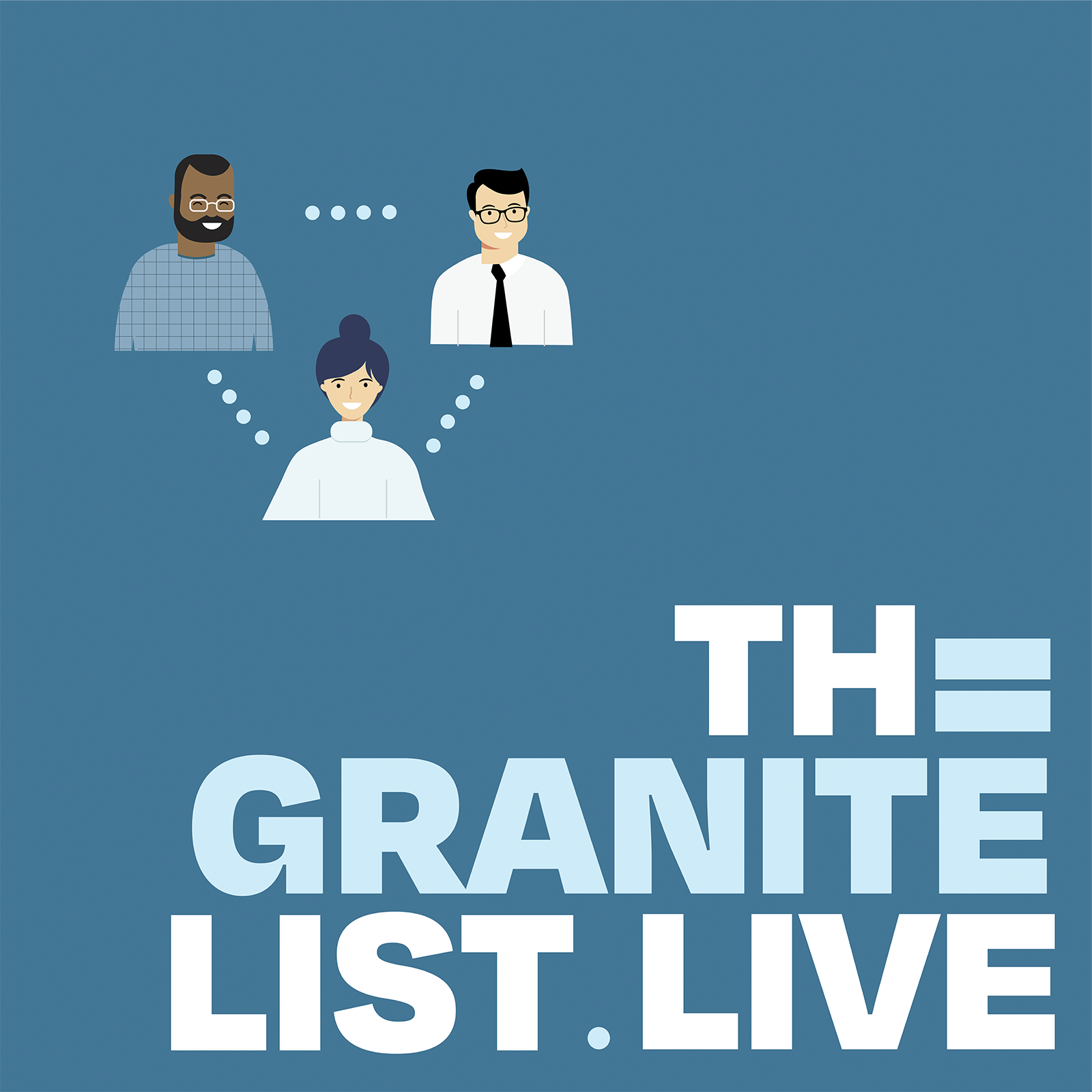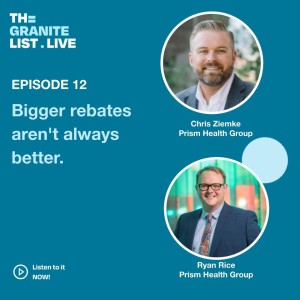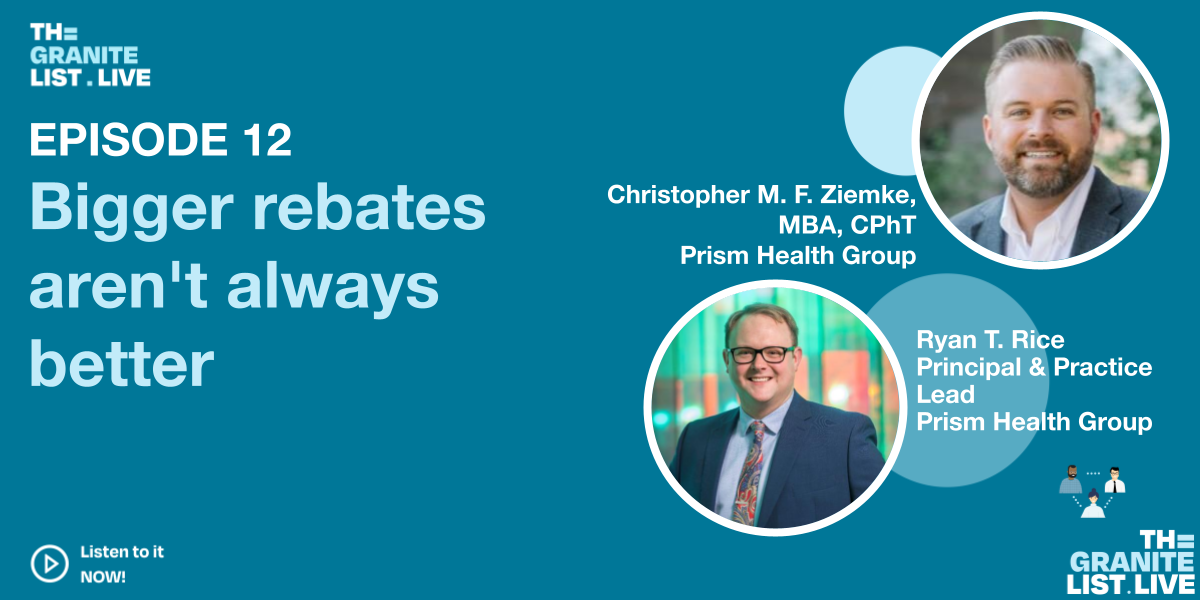
In 1877, the Granite Workers’ Union was the first to offer sick benefits to its employees. They built a way for their community to rally around those who needed medical attention and support to get back on their feet. Today, The Granite List, powered by Connect Healthcare Collaboration, is working to instill that same sense of community by connecting benefits solutions that add real and lasting value to plan members.
In 1877, the Granite Workers’ Union was the first to offer sick benefits to its employees. They built a way for their community to rally around those who needed medical attention and support to get back on their feet. Today, The Granite List, powered by Connect Healthcare Collaboration, is working to instill that same sense of community by connecting benefits solutions that add real and lasting value to plan members.
Episodes

Tuesday Nov 02, 2021
Bigger rebates aren‘t always better.
Tuesday Nov 02, 2021
Tuesday Nov 02, 2021

Welcome back to the second half of the interview with Ryan Rice and Chris Ziemke from Prism Health Group. Our conversation continues, but we switch gears to the topic of rebates themselves that are oftentimes set forth in a proposal from a PBM. And what we've noticed in those rates is there's been such a degree of escalation over the last five years. Chris says, "you're getting bigger rebates, but you're also spending a lot more in stepping over a dollar to pick up a needle. And that's really not the advised direction that we would take with folks. And we're going to see more of this."
This concept of the aggregator and the way in which a rebate aggregator works with plan sponsors is emerging in the marketplace, along with the emergence of GPOs or group purchasing organizations.
You will also hear Prism's advice on the one additional question you should ask that is not typically asked in an RFP. Listen to this episode, Bigger rebates aren’t always better.
The complete transcript to this episode is here:
Announcer (00:07):
Welcome to another episode of The Granite List Live. Navigating a sea of benefit solution is daunting at best, and new vendors emerge every week. Hosts Leigh Dill and Sally Pace bring brokers and employers a solid resource when it comes to uncovering what's new, what's needed, and what is happening now to allow for the best plan design possible. By staying on top of trends, brokers and employers can in turn stay on top of spend while improving employee engagement and outcomes.
Announcer (00:36):
Welcome back to the second half of the interview with Ryan Rice and Chris Zieme of Prism Health Group. Our conversation continues, but we switch gears to the topic of rebates themselves that are oftentimes set forth in a proposal from a PBM. And what we've noticed in those rates is there's been such a degree of escalation over the last five years. Chris says you're getting bigger rebates, but you're also spending a lot more in stepping over a dollar to pick up a needle. And that's really not the advised direction that we would take with folks. And we're going to see more of this. This concept of the aggregator and the way in which a rebate aggregator works with planned sponsors, is emerging in the marketplace, along with the emergence of GPO's or Group Purchasing Organizations. You will also hear Prism's advice on the one additional question you should ask that is not typically asked in an RFP. Listen to this episode, bigger rebates aren't always better.
Sally Pace (01:46):
I'm going to switch gears to another hot topic, Rebates.
Chris (01:52):
Oh boy.
Sally Pace (01:54):
That if someone could tell me exactly how they're calculated, I think they would win.
Ryan Rice (01:59):
We're going to need another podcast to answer that one, another podcast and an abacus to answer that one, I have to take my socks off to count to 20. So I don't know.
Sally Pace (02:09):
So we'll save that for another date but direct rebates verse rebate aggregators. There's a shift to move to the rebate aggregators. Can you explain what that is and, and why it's beneficial and why we're seeing that shift?
Ryan Rice (02:23):
Is a really important topic, as when we are running a, what we call our partner alignment or a procurement effort. For example, we see this very plainly is the variance and the difference in the metrics around the rates, so that the rebates themselves that are oftentimes set forth in a proposal from a PBM. And what we've noticed in those rates is there's been such a degree of escalation over the last five years, and I think a lot of that hinges on a couple different factors. Number one, its a more expensive product to market and there's more competition. So between manufacturers and PBMs, there's a lot of stickiness in those relationships where, you know, to avoid the term pay for play, but maybe a more appropriate way of describing it, is that the manufacturers are in a sense going to give more advantageous rebate for placement on formulary as well as for adding a removal of different utilization management, like prior authorization requirements.
Ryan Rice (03:26):
So we see a lot of variance there, but one of the things that is probably most notable is this concept of the aggregator and the way in which a rebate aggregator works with plan sponsors and how a new concept called the GPO or a Group Purchase Organization is also emerging in the marketplace. In a nutshell, what we're seeing is that it's almost a race to who can ever put forth the very best rebate guarantee. And that's all predicated on, sometimes some really a bad underwriting, which is going to prefer the use of branded drugs over more than appropriate generics. We call this, you know, seeking the lowest net cost is what the preferred mechanism is. However, in order to be competitive on the spreadsheet, oftentimes PBMs are going to put forth their nastiest formulary that excludes certain products and the preferred rebate-centric products to win that business.
Ryan Rice (04:25):
But then what we find is there is an escalation of total net cost. You're aggregating bigger rebates, but you're also spending a lot more. It's stepping over a dollar to pick up a nickle, and that's really not the advised direction that we would take with, folks. And we're going to see more of this. We're going to see more of this genuine desire to get as much rebate as you can, as smaller PBMs, oftentimes use a GPO or an aggregator to gain access to collectively negotiate with manufacturers to get better rebates. I think historically, it was a lot of aggregator organizations.
Ryan Rice (05:03):
What you're going to see now are the big PBM;s, the big threes like Express, CDS and Opium RX. They control the majority of share. They have direct manufacturer relationships with drug manufacturers and they've created group purchase organizations. Express Scripts, for example, owns the GPO called Ascent. And so Ascent is also offering up, through Express Pride Therapeutics and others, the ability to tap into those rebate arrangements. I see, and I think we, as a firm, believe it's the desire to partner with these GPOs is only going to increase. You're going to see the big three in a sense, controlling the aggregation services that are out in the marketplace, which I don't think is going to ultimately bend the curve reverse in lowering the cost of products, but also we're going to see this desire to increase the rebates as well.
Leigh Dill (06:03):
So how would that work on your effort RFP? You've got one of the big three that you already contracted with and you've got , lets say, two smaller PBMs that are also on the sheet. Like you said, the HR director of CFO was saying, "who's going to give me the biggest rebates?'. Is the larger PBM in a monopoly state that they automatically get the higher rebates, even though those smaller groups might partner with their aggregator. Are they controlling that at all?
Ryan Rice (06:37):
So super good question, and, I think the answer is yes and no. It really depends upon, I think the opportunity that a group is going after. So let's say there is a 20,000 life municipality, like a states and health plan of sorts for the employees. Lets say Express Scripts or Prime Therapeutics is going to bid on this, who own, or have a part ownership of Ascent, the GPO. So you would think that those entities could have the very best possible rebates or would be the most competitive on the spreadsheet, right? But also you may have a smaller PBM that has a negotiating deal with Express and or Prime or whomever as part of that. One would think that, for sure, if you take out the middle person there, they should be able to write the very best possible offer, the best rebate.
Ryan Rice (07:32):
But what we're finding is that for strategic opportunities, the big ones will go after it. They'll take a loss order to win that business and then try to make it up in years, two, three, or whatever, but its still dependent on how deep they want to go. What is the profitability they're trying to understand, they got to make on a certain case. And we've seen scenarios where the smaller PBMs that are aligned with that same GPO are actually more aggressive because they've chosen that, "I'm going to make my money elsewhere, maybe with an admin fee or maybe with some other. I'm going to maybe earn spread on the network discounts, but I'm going to pass through all the rebates that I'm getting from my GPO". So it's very possible depending upon how the PBM downstream or that smaller entity chooses to set forth their offering, just like it is. It depends upon how the large PBMs who own the GPO, would also put forth their pricing. Very possible that you can see a reverse of what should be intuitively competitive.
Leigh Dill (08:36):
You've got so much experience in this and so much understanding of it. Can a broker bring you guys in during an RFP to help explain, contract negotiations for the client to really see, who has the best value, even though one rebate might be higher than the other?
Ryan Rice (08:53):
Absolutely and emphatically, yes. We heard, its absolutely, well, right? So whether it's a project or an ongoing relationship, we love doing the partner alignment, the RFP process. We feel that we've got a different approach that measures things very differently. And especially with rebates, we actually look at the mix of the products themselves to sort through that concept of lowest net cost. Because the mix of product is what's ultimately going to determine your certain starting points and every PBM is a little bit different in what they, in a sense prefer as their mix of product. So taking the time and the diligence to understand what's going on, to then present multiple options via procurement, via market check. We love that stuff. It would be a genuine privilege and honor, to be able to do that with advisors who think the way we do in vice versa.
Leigh Dill (09:51):
Awesome. So tell us-
Chris (09:51):
I was going to say, if you've seen one PBM contract, you've seen one PBM contract. As Ryan said, we love rolling up our sleeves, to dig down into it, and to find what makes those PBMs unique and explaining and helping our clients and broker friends. I'm a contract geek. I love that stuff. So set up my way.
Leigh Dill (10:11):
So let's take that geek to a new level. I got the nicest way to possible. So we've got both employers and brokers in our audience listening, and you are pushing the ball uphill in a really fast way in this PBM space. If you had a magic pen and could help them write one question that is probably not on their RFP for PBMs, what would that question be?
Ryan Rice (10:37):
Oh boy. That's a good one.
Chris (10:41):
You kind of limited to one question so I-
Leigh Dill (10:43):
Just one, lets get to the one then
Ryan Rice (10:45):
That one thing in the, what could it be? Oh man. Chris, what you think?
Chris (10:52):
To me. I always want to know how someone is making their money. And what I mean by that is you have PBMs, their only source of revenue. So similar to Prism, our only source of revenue is our admin fee that we charge. It's all in. You get everything straight up. This is how it is. You have others that maybe don't charge an admin fee, but there are maybe some other hidden streams of revenue that are deep within the contract. So for me, my one magic pen is how is it that you are making money to help keep the lights on, pay for your employees? It all comes down to the financials, for me.
Ryan Rice (11:37):
I mean, there's lots to things like termination without cause of course I mean to say. Having clarity of terms are also really important. I think the problem with other entities out there. They get this silent approach. You can't look at one particular aspect in a vacuum. You're never going to win a deal on a dispensing fee. You're never going to lose a deal on what kind of ancillary programs that likely will never get put in place, are actually going to be in a sense implemented. So therefore I think the most important aspect for any advisor who's out there, who, or any plan sponsor that's out there, you have to maintain your autonomy, period.
Ryan Rice (12:18):
You need the ability and the right to make decisions for yourself. That means having access to your data, audit ability, the right to terminate. All of these things are critically important. But I think the one question I would ask is, PBM, how are you going to help in a sense, create an autonomous relationship that is not based on exclusivity, in a large sense of things, but that's going to give me the right and the ability to, in a sense, create a solution for my employee benefit plan, that's going to amplify that vision that they have and, and making sure that that is a priority?
Leigh Dill (12:58):
Good questions. So if they don't want to write those questions themselves, how can they get in contact with you guys to help with project work? Can you give us-
Ryan Rice (13:07):
We've got three to 400 other ones that we would be happy to give them too.
Chris (13:10):
Absolutely.
Ryan Rice (13:13):
I think the best way to contact us is a number of different ways. You can reach out to us through our website, which is www.theprismhealthgroup.com. You can reach out and there's a series of different ways to contact. But I think that a great way would be to use your grant list functionality as we are on that list and love being part of it. Those folks do a fantastic job. So you can definitely hit us up through that medium. And they'll direct you straight to Chris, and, or myself. Otherwise, you can hit us up. We'd be happy to share our direct contact information or hit us on LinkedIn. Either way, send up a smoke flare or even a carrier pigeon. We'll take every bit of it. But we would love to work with anyone who believes in some of the things that we've talked about today.
Leigh Dill (14:00):
Fantastic. We really appreciate the conversations today and on a separate note, can you share your favorite book? What are you reading now or what is something that stays on your coffee table?
Ryan Rice (14:12):
Travels with Charlie? I'm a John Steinbeck nerd. I love it. I wasn't a big fan of grapes and wrath. I'll be first to admit, but the travels with Charlie, I think it's such a great and timeless book. It's a classic. And if you like dogs, you would love this book. So go out there. You probably already read it, but it's a good one.
Chris (14:34):
For me. One book that I, I tend to keep reading and have in my bookcase or coffee table, is the, Last Lecture with Randy Pausch, who is a computer science professor at the Carnegie Mellon University in Pittsburgh, Pennsylvania. It hit home. I've had cancer deaths in my family and for him to give his last lecture, terminally ill, and pretty much telling his class to continue chasing their childhood dreams. Really, kind of hit home for me. My childhood dreams has always been to help people. I feel now more than ever, I'm in a position that really allows me to help people, especially ones that want to be helped as it relates to their pharmacy costs. So that one is always kind of, "you know what, I haven't this one in a while. I want to read it again"
Sally Pace (15:24):
Got that. Awesome.
Leigh Dill (15:26):
Thank you very much and thanks audience for tuning in.
Ryan Rice (15:34):
Thank you guys. We appreciate your time.
Chris (15:37):
You’re welcome.
Sally Pace (15:42):
Thank you for listening to this episode of The Granite List Live. Access our entire library by visiting your favorite podcast venue or subscribe in our site, thegranitelist.live

No comments yet. Be the first to say something!